Philippine Competition Act
Sen. Bam on the President’s invitation to China Telco players
Natutuwa tayo sa pagkilala ng Pangulo na kailangan nating pagandahin ang ating sektor ng telekomunikasyon sa pamamagitan ng kumpetisyon, subalit hindi tayo dapat malimita sa isang bansa lamang.
Kung ang maliit na bansa gaya ng Singapore ay mayroong anim na players sa telco sector, dapat maging ganito rin kasigla ang kumpetisyon sa ating bansa.
Habang isinusulong natin noon ang Philippine Competition Act, nakatagpo tayo ng interes mula sa mga kumpanyang galing Japan at Korea na gustong pumasok sa ating industriya ng telco.
Kahit ang maliliit nating local cable operators ay nais magsamasama upang makipagkumpitensya sa malalaking Telcos.
Gawin nating madali para sa mga kumpanyang ito na makapasok sa merkado at tanggalin na ang red tape upang mapaganda ang serbisyo ng internet at bumaba ang presyo nito para sa mga Pilipino.
Sen. Bam: Gov’t, private sector no more excuses for poor Internet quality
With the imminent passage of the Free Internet in Public Places Act, the implementation of the Philippine Competition Act and the proposed National Broadband Plan (NBP), the government and the private sector will have the necessary platform to improve the country’s internet quality and access.
“We’re breaking down barriers to improving the Internet through our policies. Now, the ball is in the executive and private sector’s court,” said Sen. Bam Aquino, chairman of the Committee on Science and Technology. He also pushed the measure in the Senate as principal sponsor and co-author.
“Our hearings have exposed the lack of infrastructure that we have. So we’re reducing red tape for the private sector and we’re also allotting the necessary budget para ang gobyerno mismo ang mamuhunan sa internet infrastructure sa ibang lugar,” said Sen. Bam.
The senator said the challenge of implementation now falls on the shoulders of the Department of Information and Communications Technology (DICT) and the private sector.
“The DICT needs two-and-a-half years for the NBP while the sector needs to be opened up to new players to strengthen competition in the market,” said Sen. Bam.
The final version of the Free Internet in Public Places Act has been approved by the bicameral conference committee. After the final version is ratified by both houses of Congress, it will be transmitted to Malacanang for President Duterte’ signature.
Sen. Bam also believes that the Republic Act 10667 or the Philippine Competition Act will encourage the entry of more players in the telecommunications industry, leading to improved Internet service at affordable prices.
“The Philippine Competition Act will usher in such competition for the benefit of Filipino consumers for the long term,” said Sen. Bam, principal sponsor and co-author of Republic Act 10667 or the Philippine Competition Act
If finished quickly, the NBP can hasten the rollout of the implementation of the Free Internet Access in Public Places Act. It will be put up starting 2018 and expected to be fully operational by 2020.
Sen. Bam Aquino on the PLDT, Globe anti-trust issue
It’s unfortunate that a legal battle has ensued even before the Philippine Competition Commission (PCC) has made a decision. Now we wait for the proper judicial process to take its course.
Ultimately, the landmark Philippine Competition Act was created to benefit our citizens. In the end, we need to make sure that Filipino consumers have access to improved internet services.
Bam fulfills campaign promise to alleviate poverty through Entrepreneurship, Employment and Education
In 2013, Sen. Bam Aquino ran with a campaign promise of uplifting lives of Filipino families and fighting poverty through education, employment, and entrepreneurship or the 3Es.
In his first three years, Sen. Bam Aquino laid the foundation for the growth of micro and small businesses, improved access to financing for entrepreneurs, lowered logistics costs for imported and exported goods, and ensured the financial literacy of generations to come.
During the 16th Congress, he worked for the passage of 14 laws in line with his commitment to the Filipino people. Nine of these laws were aligned with his advocacy to build an effective support network for local business, particularly the micro, small and medium enterprises (MSMEs), and promote ease of doing business.
These are the landmark Philippine Competition Act, Go Negosyo Act, Foreign Ships Co-Loading Act or Amendments to the Cabotage Policy, Youth Entrepreneurship Act, Microfinance NGOs Act, Credit Surety Act, Lemon Law, the Customs Modernization and Tarrif Act, and the Department of Information and Communication Technology (DICT) Act.
After gathering dust for more than two decades, the Philippine Competition Act was finally enacted into law thanks to Sen. Bam Aquino’s efforts as co-author and principal sponsor in the Senate.
Dubbed by Sen. Bam as a “historic, game-changing legislation for the economy”, the Philippine Competition Act or Republic Act 10667 provides a level-playing field for all businesses and penalizes bad market behavior and abuse of dominant positions.
The law expected to improve the quality and lower the prices of goods and services by eliminating cartels, and penalizing anti-competitive agreements and abuses of dominant players in the market.
The Go Negosyo Act, the first law passed by Sen. Bam in the 16th Congress, mandates the establishment of Negosyo Centers in all municipalities, cities and provinces that will assist micro, small and medium enterprises in the country.
“This is a part of our pledge to work for the development of MSMEs to help create jobs and livelihood for many Filipinos and spur the country’s economy,” said Sen. Bam, the youngest senator in the 16th Congress.
There are already 200 Negosyo Centers catering to the needs of struggling entrepreneurs in the country, from returning OFWs and carinderia owners to farmers and social entrepreneurs.
As chairman of the Committee on Trade, Commerce and Entrepreneurship, he also initiated investigations into the slow and expensive Internet in the country and the congestion in the Port of Manila.
The investigation produced several triumphs that will help improve the Internet service in the country, including the much-awaited IP Peering between Globe and PLDT.
In the 17th Congress, he is expected to head the Committee on Education, hoping to elevate the quality of Philippine education, particularly in our public schools to global standards so that more young Filipinos can build a brighter future for themselves and their family.
Sen. Bam has already filed four education-related measures such as the Free Education in State Colleges and Universities (SUCs), Free Education for Children of Public School Teachers’ Children, Abot Alam, and the Trabaho Center in Schools bills.
Even with education on his mind, he continues to push for his social entrepreneurship advocacy and is still building a robust support system for small business with the filing of bills to support Small Business Tax Reform, Startups, and Social Enterprises, among others.
Sen. Bam is relentless in his pursuit to fulfill his campaign promise of the 3Es to achieve inclusive growth and help Filipino families overcome poverty.
Sen. Bam: Competition law to help Duterte improve PH Internet
A senator believes that presumptive President-elect Rodrigo Duterte can improve the state of country’s Internet with the help of the Philippine Competition Act, which will encourage the entry of more players in the telecommunications industry.
Sen. Bam Aquino expressed elation over Duterte’s pronouncement that he will encourage the entry of competition if local telecommunication players fail to improve quality of the country’s Internet.
“We are confident that the Philippine Competition Act, a law we passed last year, through the Philippine Competition Commission, will usher in such competition for the benefit of Filipino consumers for the long term,” said Sen. Bam, principal sponsor and co-author of Republic Act 10667 or the Philippine Competition Act
Sen. Bam said more players in the telecommunications industry will create competition in the market, which, in turn will result to improved service at affordable prices for consumers.
It took 25 years before Congress finally enacted the Philippine Competition Act into law and it happened under Sen. Bam’s watch as chairman of the Committee on Trade, Commerce and Entrepreneurship.
The Philippine Competition Act will help sustain the country’s ever-growing economy and ensure a climate that provides a level-playing field for all businesses.
“We will continue to develop and push policies to provide the public access to quicker and more affordable Internet services,” added Sen. Bam, who spearheaded several hearings on the slow and expensive Internet service in the country.
Meanwhile, Sen. Bam also lauded President Aquino’s approval of the creation of the Department of Information and Communications Technology (DICT) into law.
“After last year’s hearings to investigate the country’s slow and expensive internet, we are finally seeing progress in our quest for improvement of internet services in the Philippines,” Sen. Bam said.
On March 2015, Sen. Bam filed Senate Bill 1091 or the Magna Carta for Philippine Internet Freedom, which proposed the establishment of a DICT
“We are happy to learn that RA 10844, an act creating the DICT, was signed into law this week,” said Sen. Bam.
2 out of 5 Legacy Laws from Neophyte Senator
In his first two years as legislator, Senator Bam Aquino worked on two of the five most important measures that were enacted into laws by the current administration.
Sen. Bam principally sponsored and co-authored the Philippine Competition Act, now known as Republic Act 10667, and principally sponsored the Foreign Ships Co-Loading Act or Republic Act 10668.
The twin measures were signed into laws by President Aquino. Moreover, the Chief Executive mentioned them as two of the five most important legislations passed by his administration during his sixth and last State of the Nation Address (SONA).
“Dahil sa Kongreso, naipasa ang mga batas na kikilalanin bilang haligi ng transpormasyong sinisimulan natin ngayon…salamat sa Philippine Competition Law…at sa pag-amyenda sa Cabotage Law,” the Chief Executive said.
Aside from the two, the President also cited the Sin Tax Reform Act, the Responsible Parenthood Act and the Act Allowing the Full Entry of Foreign Banks.
President Aquino described the measures as part of the administration’s campaign, “kung walang corrupt, walang mahirap.”
“Hinabol natin ang mga corrupt at nilinis ang sistema, na nanganak ng kumpiyansa sa ating mga merkado. Pumasok ang negosyo, lumawak ang oportunidad… nakikitang meron nang level playing field; naaasahan ang pag-asenso nang hindi kailangang mandaya,” the President said.
Senate President Franklin Drilon, for his part, said that the Philippine Competition Act would address the nation’s long-standing absence of a comprehensive competition law in effect during his speech on the opening of the 3rd regular session of the 16th Congress.
Drilon also noted that the Foreign Ships Co-Loading Act would widen the market and is expected to lower the cost of transport of agricultural goods and other local produces, which ultimately would affect prices of products sold to consumers.
Stakeholders, such as the Makati Business Club, Philippine Chamber of Commerce and Industry and the European Chamber of Commerce in the Philippines, also hailed the passage of the twin laws, saying these would boost the competitiveness of Philippine enterprises and help sustain economic growth.
Dean Tony La Vina, head of the Ateneo School of Government, believes that the Fair Competition Act is the “antidote to the adverse effects of monopolistic behemoths that make our economy less competitive vis-à-vis other Asean member countries.”
“It is a measure that will position us better in the forthcoming Asean economic integration. If well implemented, fair competition will certainly result in prosperity,” he said in his newspaper column.
Furthermore, National Economic and Development Authority (NEDA) head and Socioeconomic Planning Secretary Arsenio Balisacan said that the Philippine Competition Act would reinforce the country’s economy.
“As the bill levels the playing field among businesses, we can expect an increased level of confidence among the international business community, and thus lead to a surge of investments and economic activity, and an expanded logistical capacity,” Balisacan said.
Overall, Sen. Bam now has four laws to his credit. Last year, the President approved the Go Negosyo Act, which was principally authored and sponsored by Sen. Bam, and the Philippine Lemon Law.
The President is also expected to sign the Youth Entrepreneurship Act soon, making it five laws for Sen. Bam, the youngest senator in the 16th Congress.
Four Laws in Two Years for Bam
Four laws in two years.
These were just some of the accomplishments of Sen. Bam Aquino, the youngest senator in the 16th Congress, during his first two years in office.
Included in the four laws authored, co-authored and principally sponsored by Sen. Bam is the landmark Philippine Competition Act or Republic Act 10667, which was passed under his watch as chairman of the Senate Committee on Trade, Commerce and Entrepreneurship, after it gathered dust in the legislative mill for almost 25 years.
Recently signed into law by President Aquino, the Philippine Competition Act will level playing field for all businesses by penalizing anti-competitive agreements and abuses of dominant players, aside from eliminating cartels that control supply and prices of goods in the market.
Aside from the Philippine Competition Act, the Foreign Ships Co-Loading Act was also signed into law by the Chief Executive.
The Foreign Ships Co-Loading Act or Republic Act 10668 will allow foreign ships carrying imported cargoes and cargoes to be exported out of the country to dock in multiple ports.
The law aims to reduce logistics costs for producers, create a more efficient import and export system, and lead to lower prices for consumers. It will also help in decongesting the major ports in the country.
Last year, the Go Negosyo Act and the Philippine Lemon Law were signed into law by President Aquino.
Sen. Bam’s campaign promises of spurring jobs and enterprise development, levelling the playing field, and ease of dong business were further fulfilled with these macro economic reforms together with the establishment of Negosyo Centers all over the country through the Go Negosyo Act.
“Just as we promised, we have worked tirelessly for the passage of these measures that will create jobs and livelihood for fellow Filipinos and a better business climate for our micro, small and medium enterprises (MSMEs),” said Sen. Bam.
In addition, the President is also expected to sign the Youth Entrepreneurship Act soon.
The Youth Entrepreneurship Act, co-authored and principally sponsored by Sen. Bam, is touted to be an effective tool to solve the growing number of jobless youths in the country, which currently stands at 1.32 million.
The enactment of this into law will make Sen. Bam’s portfolio of laws to five in two years.
“Hindi mahalaga ang edad, kung bagito ka man o beterano sa posisyon natin. Ang mahalaga, kailangang nagtatrabaho tayo para sa kapakanan ng sambayanan na siyang naglagay sa atin sa trabahong ito,” added Sen. Bam.
Moreover, the Responsive, Empowered, Service-Centric Youth Act, which aims to institutionalize youth participation in disaster risk and reduction planning, was passed on third reading.
He was also able to file a committee report on the Mircofinance NGOs Act, which aims to empower the sector that provides microfinancing services to micro businesses.
Aside from his legislative work, Sen. Bam also initiated an investigation into the country’s expensive and slow Internet connection.
The investigation has produced several victories that will help improve the country’s Internet service. It encouraged telecommunication companies to embrace IP peering with the Department of Science and Technology (DOST) while the Department of Justice (DOJ) has released guidelines against deceptive or misleading Internet print, TV and radio advertisements.
The National Telecommunications Commission (NTC), for its part, is also expected to craft a memorandum circular that will set the quality of standards for all telecommunication companies to follow, be it broadband or DSL.
Sen. Bam also looked into the port congestion that hounded the Port of Manila early this year. After several hearings, port operations went back to normal, with utilization rate now between 70 to 80 percent.
Lastly, Sen. Bam worked together with the Department of Trade and Industry (DTI), local governments, the academe, business clubs and other private groups in the establishment of Negosyo Centers that will assist small businesses.
Through the Go Negosyo Act, the Negosyo Centers aim to provide ease of doing business, access to business training & education, development services and financing for the growth of MSMEs.
As of this month, 61 Negosyo Centers have been established and 50 more are expected to be put up by the end of the year.
P-Noy Thanks ‘Kuya Bam’ for PH Competition Law
President Benigno Aquino III thanked Sen. Bam Aquino for his efforts to pass two crucial legislative measures that will further sustain the country’s economic growth and boost the government’s inclusive growth agenda.
In his speech, the Chief Executive lauded Sen. Aquino, whom he playfully referred to as “Kuya Bam”, for working for the passage of the Philippine Competition Law and the Foreign Ships Co-Loading Act, now known as Republic Act 10667 and 10668, respectively.
The measures were signed by the Chief Executive during a ceremony at Malacanang Palace today (July 21).
“Partikular po nating pinasasalamatan, unahin ko na po, pasensiya na po kayo, ‘yung kuya ko si Bam Aquino, at ang marami pang ibang sponsor at may-akda ng dalawang batas na ito,” President Aquino said in his speech.
The President said the Philippine Competition Act, which took almost 25 years to pass into law, would help sustain the country’s ever-growing economy and ensure a climate that provides a level-playing field for all businesses.
“Sa pamamagitan ng dalawang panukalang batas na pinagtibay natin sa araw na ito, tinatanggal natin ang mga baluktot na kalakarang dulot ng kawalan ng kumpetisyon, na walang nadadalang pakinabang sa ating mamamayan,” said the Chief Executive.
The President also stressed the importance of the Foreign Ships Co-Loading Act, saying that it will lead to lower prices of logistics and lower prices of goods for consumers
“Sa mga amyenda po ninyo, malayang makakapagkalakal ang mga banyagang barko ng kanilang imported at exported na kargamento sa kanilang napiling port of destination. Dahil dito, mapapadali at mapapamura ang export at import ng mga produkto, na magbubunsod ng mas masiglang merkado,” he said.
“Sa pinagtibay nating Philippine Competition Act at Liberalization of Philippine Cabotage, ang pagbabagong tinatamasa natin ngayon ay magpapatuloy hanggang sa mga susunod pang henerasyon,” the Chief Executive stressed.
The Philippine Competition Act levels the playing field for all businesses by penalizing anti-competitive agreements and abuses of dominant players, aside from eliminating cartels.
Under the law, a Philippine Competition Commission (PCC) will be established with the Chief Executive appointing a chairperson, four commissioners and an executive director.
As an independent quasi-judicial body, the PCC will look into anti-competitive behaviors, abuses in dominant positions, and anti-competitive mergers and acquisitions.
The Foreign Ships Co-Loading Act allows foreign ships carrying imported cargoes and cargoes to be exported out of the country to dock in multiple ports.
With the approval of these two measures, Sen. Bam now has four laws to his credit. Last year, the President approved the Go Negosyo Act and the Philippine Lemon Law.
P-Noy to Sign Landmark PH Competition Act and Amendments to Cabotage Policy into Laws
Two important, historic, game-changing bills to continue pushing the country’s progress and inclusive economic growth will be signed into laws by the President tomorrow.
In a ceremonial signing in the Malacanang Palace tomorrow, July 21, Tuesday, at 10 am, President Aquino will approve the landmark Philippine Competition Act, giving the country its own law that will level playing field for all businesses by penalizing anti-competitive agreements and abuses of dominant players.
The Chief Executive is also expected to sign into law the Foreign Ships Co-Loading Act, which will now allow foreign ships carrying imported cargoes and cargoes to be exported out of the country to dock in multiple ports.
The Philippine Competition Act is considered the longest-running measure in Congress, taking 25 years before hurdling the legislative mill.
“The Philippine Competition Act will usher in a new era of doing business in the country,” said Sen. Bam, co-author and principal sponsor of the measure.
Under the law, a Philippine Competition Commission (PCC) will be established with the Chief Executive appointing a chairperson, four commissioners and an executive director.
“Businesses, whether big or small, will now be on equal footing as the law penalizes anti-competitive agreements and abuses of dominant players,” stressed Sen. Bam, adding that cartels will also be eliminated under the law.
As an independent quasi-judicial body, the PCC will look into anti-competitive behaviors, abuses in dominant positions, and anti-competitive mergers and acquisitions.
“This will lead to an efficient market economy and a level playing field for all businesses,” added Sen. Bam, chairman of the Senate Committee on Trade, Commerce and Entrepreneurship.
The PCC can impose administrative penalties of a maximum fine of P100 million on the first offense and P250 million for the second offense for anti-competitive agreements and abuses of dominant position.
Moreover, courts can impose criminal penalties of imprisonment from two to seven years and a maximum penalty of P250 million for anti-competitive agreements done between and among competitors. The imprisonment will be imposed to responsible officers and directors of the entity.
Aside from the Philippine Competition Act, the Chief Executive will also sign into law the Foreign Ships Co-Loading Act, another measure sponsored by Sen. Bam.
The Foreign Ships Co-Loading Act will reduce logistics costs for producers, create a more efficient import and export system, and lead to lower prices for consumers. The law will also help in decongesting the major ports in the country.
With the approval of his two measures, Sen. Bam will have four laws to his credit. Last year, the President approved the Go Negosyo Act and the Philippine Lemon Law.
In addition, the President is also expected to sign the Youth Entrepreneurship Act soon.
The Youth Entrepreneurship Act, co-authored and principally sponsored by Sen. Bam, is touted to be an effective tool to solve the growing number of jobless youths in the country, which currently stands at 1.32 million.
Financial literacy and entrepreneurship courses will now be included in all levels of education to build an entrepreneurship culture among Filipinos. A youth entrepreneurship fund shall also be made available to cater to youth entrepreneurs in the country.
Sen. Bam’s campaign promises of spurring jobs and enterprise development, levelling the playing field, and ease of dong business were further fulfilled with these macro economic reforms together with the establishment of Negosyo Centers all over the country through the Go Negosyo Act.

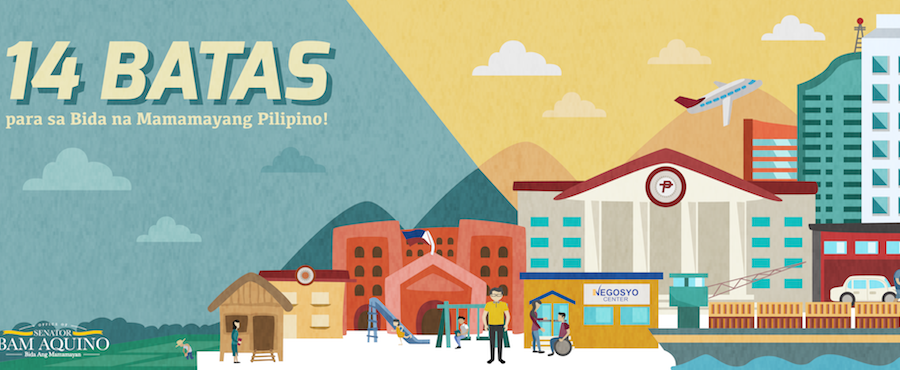
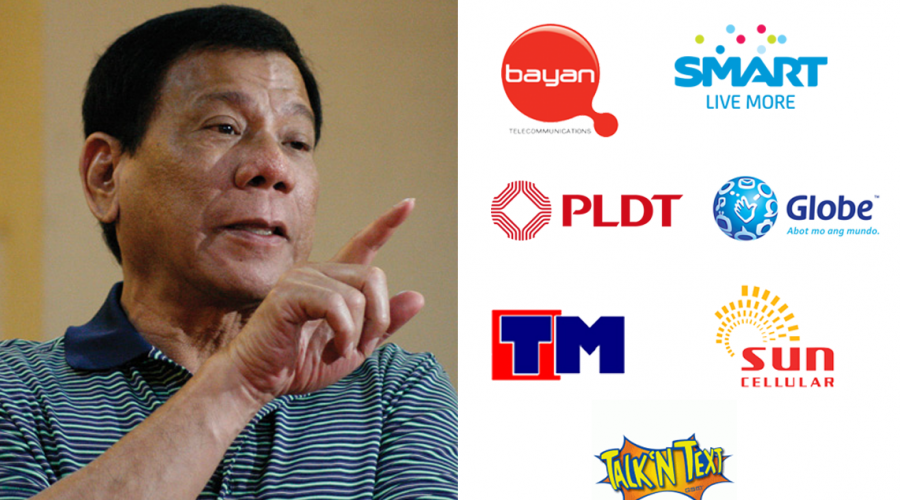
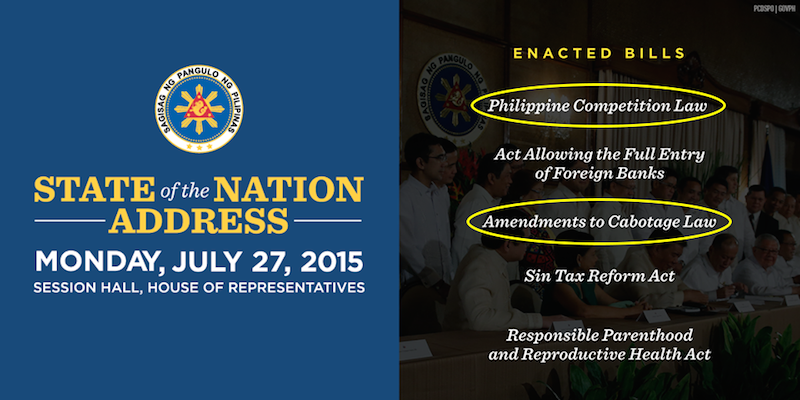
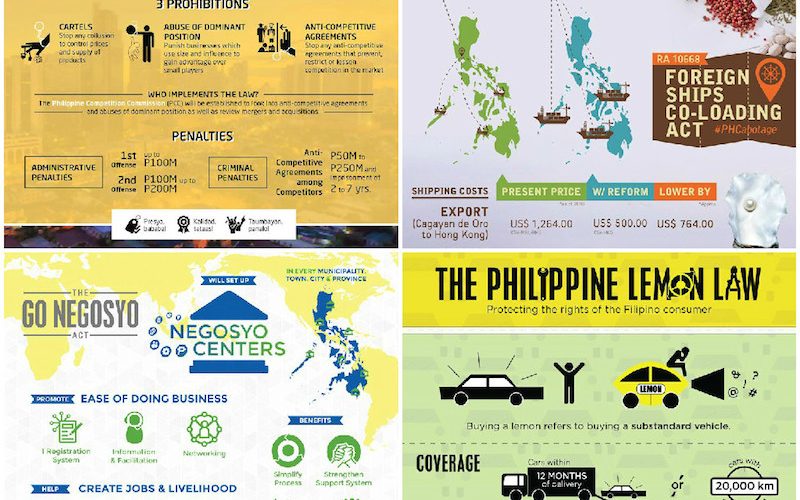
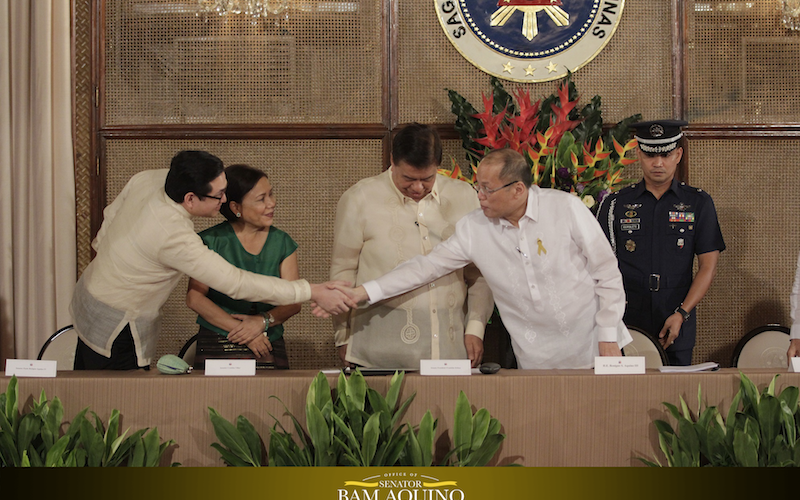

Recent Comments